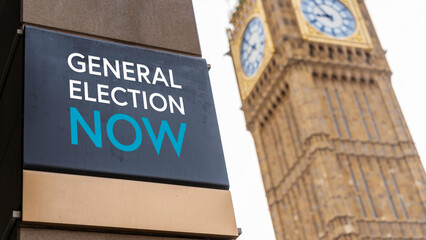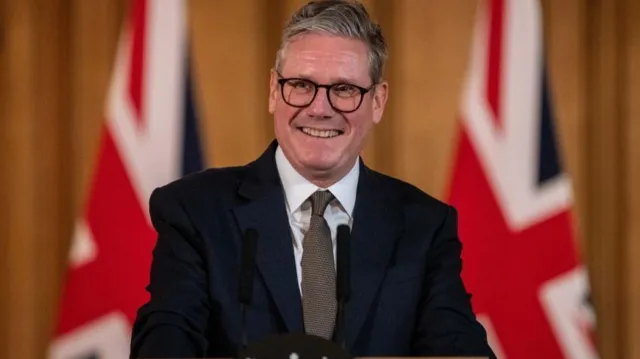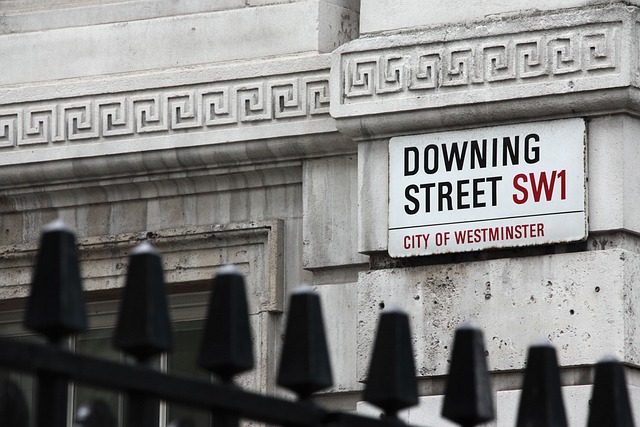UK General Election 2024: A Comprehensive Analysis

The UK general election took place on Thursday, 4 July 2024. Here are the key points:
- The Conservative Party, led by Prime Minister Rishi Sunak, was defeated in a landslide.
- The Labour Party, led by Sir Keir Starmer, achieved a 172-seat majority and a total of 411 seats.
Keir Starmer: The Basics

Age: 61
Education: Reigate Grammar School, University of Leeds, University of Oxford
Family: Married to NHS occupational therapist Victoria Alexander; they have one son and one daughter
Constituency: Holborn and St Pancras since 2015
Keir Starmer often highlights his working-class background, growing up in a pebble-dash semi in Oxted, Surrey. His father was a toolmaker, and his mother, a nurse, suffered from Still’s disease, a rare autoimmune condition. Starmer attended Reigate Grammar School, which turned private two years after he joined, with fees covered by the local council until he was 16.
He went on to study law at Leeds and Oxford, becoming the first in his family to attend university. In 1987, he became a barrister specializing in human rights law, working globally to defend death row prisoners. In the late 1990s, he represented McLibel activists pro bono against McDonald’s. In 2008, he was appointed Director of Public Prosecutions, the top criminal prosecutor in England and Wales.
- This victory marked the first time Labour won a general election in 19 years.
- The Conservative Party experienced its worst defeat in history, securing only 121 seats.
- Labour became the largest party in Scotland for the first time since 2010 and dominated in Wales, Inner London, Northern England, and much of the Midlands1.
The new Parliament convened on Tuesday, 9 July 2024, with the election of the Speaker, followed by the State Opening of Parliament and The King’s Speech on Wednesday, 17 July 20242.
UK General Election 2024: Main Parties and Leaders
- The Conservative Party, led by Prime Minister Rishi Sunak, was the incumbent party. The Labor Party, led by Keir Starmer, emerged as the main opposition.
Election Results
Labour won a substantial majority in Parliament, with 412 seats. This victory allowed Keir Starmer to become the new Prime Minister, following the ceremonial “kissing of hands” with King Charles III.https://www.theguardian.com/politics/ng-interactive/2024/jul/04/uk-general-election-results-2024-live-in-full?CMP=share_btn_url
Importance of the UK General Election 2024 in the UK’s Political Landscape
- End of a Long Conservative Rule
The 2024 election marks the end of a 14-year Conservative rule, with the Labour Party poised to take over. This shift indicates significant changes in the UK’s political and policy directions.
- Response to Key Issues
Unlike the 2019 election, which was heavily influenced by Brexit, the 2024 election focused on different pressing issues such as the economy, healthcare, and social welfare. These issues reflected the evolving concerns of the British electorate.
- Potential Policy Shifts
The Labour Party’s victory brings the potential for significant policy shifts, particularly in areas like science and environmental policy, which have been highlighted as priorities.
- Impact on Future Governance
The election results will influence the UK’s future governance, setting the stage for new legislative agendas and government priorities. This election is seen as a landmark event that will shape the political landscape for years to come.
- Voter Sentiment and Political Engagement
High voter turnout and engagement in the 2024 election demonstrate a strong public interest in shaping the nation’s future. The shift in voter sentiment away from the Conservatives indicates a demand for change and new leadership.
Key Issues Influencing the Election
The 2024 UK General Election has been shaped by several critical issues that resonated deeply with the electorate. Here are the key issues that influenced the election:
- Economy: The cost of living crisis has been at the forefront, with voters deeply concerned about inflation, stagnant wages, and economic stability.
- Public Services: The state of public services, including the NHS, education, and social care, was a significant factor. The quality and accessibility of these services have been under scrutiny.
- Immigration: Immigration policies and their impact on society and the economy were hotly debated, with different parties offering varying solutions.
- Climate Change: Environmental issues and the commitment to addressing climate change influenced voter decisions, with expectations for stronger action and policies.
- Housing: Affordable housing and housing policies were crucial, with many voters concerned about housing availability and affordability.
- Brexit Aftermath: Although not as dominant as in previous elections, the ongoing impact of Brexit continued to influence voter attitudes, especially regarding trade and international relations.
- Leadership and Integrity: The integrity and leadership qualities of party leaders were pivotal, with voters seeking trustworthy and competent leadership during turbulent times.
Political Climate Leading Up to the Election
The 2024 UK General Election was marked by a significant shift in the political landscape, influenced by several key issues:
Economic Concerns: The high cost of living, inflation, and economic instability were paramount in voters’ minds. Many felt the Conservative government had failed to adequately address these issues over their 14-year tenure.
Public Services: There was widespread dissatisfaction with the state of public services, including the NHS, education, and public transportation. Voters were eager for reforms and improvements, which Labour promised in their campaign.
Leadership and Governance: After several tumultuous years under Conservative leadership, many voters desired stability and a change in leadership style. Keir Starmer’s Labour party capitalized on this sentiment, presenting a centrist, reform-oriented agenda.
Environmental Issues: Climate change and environmental policies also played a crucial role. Labour’s green policies resonated with younger voters and those concerned about sustainability.
Immigration and International Relations: Immigration policies and the UK’s stance on international issues, including relations with the EU post-Brexit, were also pivotal. Both main parties had to navigate complex voter sentiments on these topics.
Other Notable Parties and Independent Candidates
In the 2024 UK general election, alongside the major parties, several other parties and independent candidates made notable impacts:
- Reform UK: Despite a significant vote share, Reform UK secured only four seats, reflecting challenges faced by smaller parties under the UK’s electoral.
- Green Party: Achieved unexpected gains, bolstering their presence in Parliament with several new seats, highlighting growing support for environmental policies.

- Independent Candidates: Several independents also won seats, demonstrating voter support for non-party-affiliated candidates in specific constituencies.
Rishi Sunak’s downfall in the election is attributed to several major policy failures:
- Economic Stagnation: Under Sunak’s leadership, the UK faced prolonged economic stagnation, which led to widespread dissatisfaction among voters.
- Public Service Failures: Significant shortcomings in public services, including healthcare and education, further eroded public confidence in his administration.
- Campaign Missteps: Sunak’s campaign was plagued by scandals, public relations failures, and allegations of insider betting, which damaged his credibility.
- Lack of Political Touch: His lack of political finesse and failure to connect with voters were highlighted throughout his campaign, leading to a perception that he was out of touch with the electorate’s needs.
- Scandals and Insider Betting Allegations: Allegations of insider betting and other scandals during his campaign severely undermined his leadership.
- General Discontent: The Conservative Party, after being in power for 14 years, faced accumulated public discontent, which was a significant factor in their electoral defeat.
The Conservative government’s alignment with US policy on Ukraine and Israel did have an impact on voter sentiments in the UK. Key factors include:
- Public Discontent: There was significant public discontent with the Conservative government’s foreign policy decisions, particularly their stance on Ukraine and Israel. These policies were seen as aligning too closely with US interests, which did not resonate well with a portion of the UK electorate.
- The UK House of Commons is composed of 650 Members of Parliament (MPs), each representing a specific constituency. Currently, Labour has won 412 seats, while the Conservatives have dropped to just 121 seats. The centrist Liberal Democrats have secured 71 seats. Reform UK, the successor to the Brexit Party, and the Green Party each hold four seats. One seat remains undecided in Scotland’s Skye and Ross-shire constituency.
- Labour’s significant win was partly due to the collapse of the Scottish National Party (SNP), which fell to nine seats following financial controversies. Labour’s projected 170-seat majority, though substantial, is slightly less than the 179-seat majority achieved by Tony Blair’s Labour in 1997. For context, the Conservative Party’s strong performance in the 2019 election under Boris Johnson resulted in an 80-seat majority.
- A majority allows a party to pass laws without needing support from other parties. However, Labour faced notable defeats from independent candidates advocating for Gaza, especially in areas with large Muslim populations.
- The party has been under pressure for its stance on the conflict, calling for a humanitarian ceasefire in February, which some critics felt was delayed. This election outcome is closely observed by center-left parties in other Western countries concerned about voter backlash over their support for Israel.
- Voter Fatigue: The continuous support for Ukraine amidst its conflict with Russia and the stance on Israel’s actions in Gaza contributed to voter fatigue. Many voters were concerned about the implications of these policies on the UK’s own economic and social issues.
- Electoral Impact: The alignment with US policies was a factor among several others, such as economic stagnation and public service failures, that influenced voter sentiments and contributed to the Conservative Party’s poor performance in the election.
- Broader Sentiments: While this was not the sole reason for the Conservative downfall, it played into broader sentiments of dissatisfaction and disillusionment with the party’s leadership and direction
- If you enjoyed this article, please like and share it with your friends, and don’t forget to subscribe for more great content!
Republicans and Democrats 2024: Acclaimed Epic Key Policies and Stances


